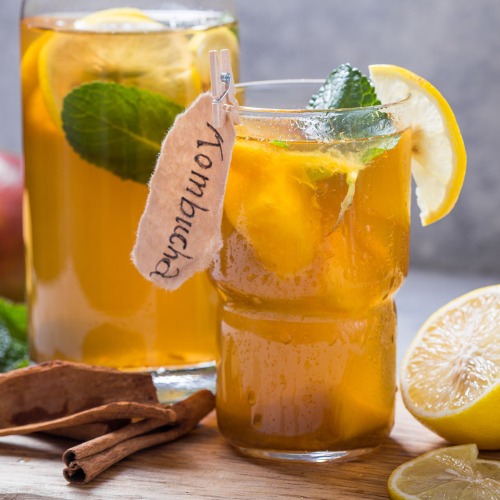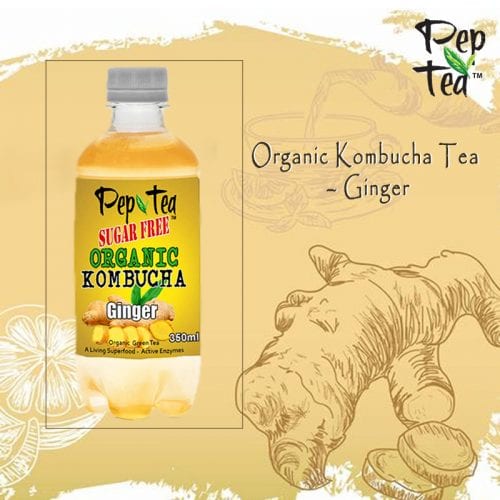Tag: kombucha tea
Kombucha Ideas for a Healthier Dry January

With its grown-up flavour profile and numerous health benefits, kombucha is the ideal tipple for a healthier dry January.
What is Dry January?
Dry January is a movement where individuals choose to abstain from alcohol for the entire month of January.
It originated in the UK in 2013 and has since gained popularity worldwide, encouraging participants to reset their bodies and minds after the holiday season. The practice provides numerous health benefits, including improved liver function, reduced blood pressure, enhanced mental clarity, and better sleep quality.
Additionally, taking a break from alcohol can foster more mindful drinking habits for the future, making Dry January a valuable and refreshing start to the year.
What is Kombucha?
Kombucha is a fermented tea beverage known for its tangy flavour and numerous health benefits. It is made by fermenting sweetened tea with a symbiotic culture of bacteria and yeast, commonly referred to as a SCOBY. This fermentation process gives kombucha its unique taste and carbonation, along with potential health-promoting properties, such as probiotics that support gut health.
Available in various flavours, kombucha offers a refreshing alternative to traditional sugary drinks and can be enjoyed by those seeking a low-calorie, nutritious option. Whether you’re new to kombucha or a seasoned fan, this drink provides both complexity and versatility, making it an ideal addition to a sober lifestyle.
Why Kombucha is a Great Alternative to Alcohol
When you’re looking to take a break from alcohol, kombucha can be a refreshing alternative. Available in a variety of flavours, from ginger and lemon to berry blends and even some with a spicy kick, there’s a kombucha for every palate. This diversity allows you to explore different taste profiles, much like you would with wines or craft beers, but without the negative effects associated with alcohol consumption.
Kombucha is rich in probiotics, which are beneficial for maintaining a healthy gut microbiome. Unlike many alcoholic beverages, which can disrupt your digestive system, the probiotics in kombucha can promote digestion and enhance nutrient absorption. This makes kombucha not just a tasty alternative, but a health-conscious choice that contributes to your overall well-being.
On top of these benefits, kombucha is a low-calorie drink, making it an excellent choice for those who are mindful of their calorie intake. While many alcoholic beverages are calorie-dense, kombucha offers a lighter option that satisfies thirst without unnecessary calories. Additionally, those who are watching their sugar intake will find kombucha to be a suitable option, as many brands offer low-sugar varieties.
Finally, swapping out alcohol for kombucha can contribute to better hydration. Unlike alcohol, which is a diuretic and can lead to dehydration, kombucha is hydrating and helps maintain the body’s fluid balance. Whether you’re participating in Dry January or simply looking to moderate your alcohol consumption, making the switch to kombucha can be a step towards a healthier, more balanced lifestyle.
Kombucha Ideas for Dry January
Kombucha is surprisingly versatile and is just as happy alongside your meal as it is in your Dry January mocktail.
Morning Boost: Start your day with a glass of kombucha to kick off your morning routine. Its natural effervescence can be a refreshing alternative to your usual caffeine fix.
Midday Refreshment: Enjoy a chilled kombucha at lunch. It pairs well with salads and lighter meals, providing a tangy counterpart to your lunch break.
Afternoon Pick-me-up: Feeling the afternoon slump? A bottle of kombucha can be a great way to recharge, offering a burst of flavour and a little energy booster.
Evening Wind-down: Savor a glass of kombucha alongside your dinner or as an after-dinner sipper. Its complex taste can complement a variety of cuisines.
Creative Mocktails: Use kombucha as a base for mocktails. Mix it with fresh fruits, herbs, or spices to craft unique non-alcoholic cocktails that are as exciting as their alcoholic counterparts.
Hydration Partner: Keep a bottle on hand during workouts or outdoor activities for a flavorful hydration option that feels a bit more special than plain water.
Pantry Staple: Always have some kombucha stocked at home. With many flavours available, it’s easy to find something for every taste and occasion.
Pairing kombucha with meals
Pairing kombucha with meals can be an interesting way to enhance your dining experience without alcohol. Thanks to its versatile flavour profile and effervescent quality, kombucha can complement a wide range of dishes.
For a light and refreshing pairing, try kombucha with a summer salad or seafood dish, as its crisp acidity can highlight fresh and tangy flavours.
When dining on spicy or savoury cuisine, like Mexican or Thai, the slight sweetness of kombucha can balance heat and spice, providing a soothing counterpoint.
If you’re enjoying a rich, hearty meal, such as pasta or grilled meats, opt for kombucha with more robust flavours, like ginger or berry, to stand up to the dish’s intensity.
Finally, consider using kombucha as a palate cleanser between courses; its bubbly nature can refresh the taste buds and prepare you for the next flavorful bite. With its diverse taste range, kombucha offers endless pairing possibilities that can elevate any meal.
Using kombucha in mocktails
Creating mocktails with kombucha is a fun and creative way to enjoy flavorful beverages without alcohol. The fizzy and tangy characteristics of kombucha make it an excellent base for a multitude of mocktail recipes, adding a touch of sophistication and a burst of flavour.
Start with a kombucha flavour that complements your desired taste profile, such as lemon-ginger or berry, and add fresh ingredients like mint leaves, cucumber slices, or a splash of freshly squeezed citrus juice. The versatility of kombucha allows for endless experimentation and perfect pairings.
Here are a few ideas to get you started.
Citrus Mint Spritzer: Combine this sugar-free lime and ginger kombucha with fresh mint leaves and a splash of orange juice. Add a twist of lime for an extra zing.
Berry Basil Fizz: Mix this apple and pomegranate-flavoured raw kombucha with a handful of fresh basil and a few muddled berries of your choice. Top with a splash of soda water for added sparkle.
Ginger Cooler: Blend cucumber slices with this organic ginger kombucha, a generous squeeze of lemon juice, and a hint of honey. Garnish with a cucumber wheel for a refreshing twist.
Tropical Sunrise: Pour this mango kombucha into a glass and mix it with coconut water, a dash of grenadine, and a slice of fresh pineapple. Serve over ice for a burst of tropical flavour.
Incorporating kombucha into your mocktails offers not only a delicious alcohol-free option but also the potential health benefits associated with kombucha. Whether you’re hosting a party or simply in the mood for something special, kombucha mocktails provide the perfect combination of taste, creativity, and wellness.
Cooking with kombucha
You can use kombucha to add depth to your cooking, much in the same way as you would add a splash of wine.
Marinades: Kombucha’s natural acidity makes it an excellent ingredient for marinades. Use it to tenderize meats and infuse them with flavour. Combine kombucha with soy sauce, garlic, and herbs to create a savoury marinade for chicken or tofu.
Salad Dressings: Enhance your salads with a kombucha-based dressing. Mix kombucha with olive oil, mustard, and honey for a tangy vinaigrette that adds a refreshing twist to any salad.
Soup and Stew Base: Add a splash of kombucha to soups or stews for a subtle depth of flavour. Its slightly tangy profile can enhance the richness of dishes like vegetable soups or chili.
Sauces: Incorporate kombucha into sauces for a unique taste. It works well in barbecue or teriyaki sauces, adding complexity and a hint of sweetness.
Fermenting Vegetables: Use kombucha as a starter culture for fermenting vegetables. It’s an excellent way to create probiotic-rich pickles or sauerkraut with an extra kick.
Choosing kombucha for Dry January comes with a host of benefits that cater to both your health and your taste buds. A delicious, low-calorie alternative to sugary sodas and high-calorie alcoholic drinks, it’s packed with probiotics, which can aid in digestion and improve gut health, making every sip not only tasty but beneficial for your body’s natural processes.
Additionally, kombucha is rich in antioxidants, which help fight free radicals in the body and support overall wellness. The natural carbonation helps satisfy the craving for a fizzy beverage, while its wide range of flavours ensures you’ll never get bored. Whether you’re enjoying it as a daily ritual, mixing it into creative mocktails, or adding a splash to your cooking, kombucha can make your Dry January an enjoyable and health-conscious journey.
Explore our range of real organic raw kombucha today. Made right here in Australia and completely sugar-free.
This article was reproduced on this site with permission from operafoods.com.au the “Organic Kombucha Wholesaler”.
See original article:- Kombucha Ideas for a Healthier Dry January
What is kombucha good for?

It has all the health credentials of tea, plus the gut boosting benefits of probiotics, but exactly what is kombucha good for?
The healthiest kombucha is made with green tea, for a whole host of added benefits. In fact, although kombucha is best known for its probiotic benefits, it is the properties of green tea that make it particularly beneficial to health.
Kombucha is good for anti-ageing
The antioxidants in green tea have powerful anti ageing properties. As well as contributing to the maintenance of healthy youthful skin as seen below, it contains protective polyphenols of the type EGCG. This is a potent anti-inflammatory that may help protect against cognitive decline.
Kombucha and healthy skin
Alongside the anti-inflammatory EGCG, green tea contains several compounds that directly support skin health. Quercetin and kaempferol (also anti-inflammatory antioxidants) help to soothe sensitive skin. The green pigment chlorophyll helps to flush out harmful toxins that can contribute to tired looking skin.
Kombucha is good for the brain
L-theanine, a component of tea (not just green) has been shown to have anti-anxiety properties and can also aid relaxation. Caffeine, especially in conjunction with l-theanine, can help improve brain function too, for a clearer, sharper mind.
And then of course there is the power of fermented foods and those little guys known as probiotics. Otherwise known as beneficial bacteria, these provide healthy bacteria for your gut.
There are many different strains of bacteria that can act as probiotics within the body, but the ones we are most interested in when in comes to kombucha are the lactic-acid bacteria it is shown to contain.
Kombucha for gut health
But what does good gut health look like? We are only just scratching the surface of the role the gut plays in our overall health and, over time, restoring your gut microbiome can be totally transformative. Yet there are two major benefits that people report from improving their gut flora.
Kombucha for energy
The first is improved energy. When your gut begins to function as it should you are likely to feel simply more energised. If you were suffering from a lack of energy or motivation then it is like a fog has been lifted.
Kombucha is good for your digestion
Many of us suffer from digestive issues. For some, it causes discomfort and even embarrassment. For others it may not even be noticeable because things have always been that way. A healthy digestion is a different beast entirely. And once things begin to function as they should, many other benefits follow.
Find out what kombucha and matcha have in common…
Our organic kombucha is available to buy online now. Made with green tea, it has all those antioxidant benefits we talked about.
This article was reproduced on this site with permission from operafoods.com.au the “Kombucha Manufacturers”.
See original article:- What is kombucha good for?
Why does kombucha need tea?

Although the clue is in the name, chances are that tea is not the first thing that springs to mind when you think of kombucha.
Good for your gut. Sure.
Fizzy. Fermented. Sour.
All of the above. Yet unless you make your own kombucha, does it even occur to you that kombucha is made from tea?
Let’s dwell on that for a moment.
Kombucha tea ingredients
Kombucha is made from five ingredients. Water, tea, and sugar, plus bacteria and yeast in the form of the SCOBY. This is left alone to ferment. The SCOBY is the live culture responsible for fermentation, a process that involves turning sugar to alcohol and alcohol to organic acids. It is similar to how rice vinegar is made.
Whilst we are busy concentrating on the amount of sugar in kombucha, or whether kombucha is alcoholic, ( a good scientifically correct kombucha has no remaining sugar or alcohol) tea is quietly getting on with its job. Turns out, tea is actually the most important ingredient in kombucha.
Why does kombucha need tea?
Tea not only makes booch taste great, and has some bonafide benefits to health, but it plays an integral part in the fermentation process too. Sugar plays an important part, but it is also the various compounds in the tea leaves that support the life of the SCOBY.
Is there caffeine in tea?
Caffeine occurs naturally in the plant camellia sinensis from which all true teas are harvested yet caffeine content in tea varies widely. Tea also contains an amino acid called l-theanine which works synergistically with caffeine to induce a state of calm alertness, as oppose to the rollercoaster ride of a coffee caffeine-high.
There are many factors that determine the caffeine content of tea. Although black tea is widely considered to have more caffeine than green tea, this may not always be the case. Some types of Japanese green tea, for instance, have more caffeine as they are grown in the shade and only the tips are harvested. Assam, a tea varietal found in many black teas, is naturally high in caffeine.
So, does kombucha have caffeine it it?
As with tea, the caffeine content of kombucha varies. The type of tea used, and the specifics of the brewing process, can affect the results. What is important to know is that less caffeine comes out than goes in because caffeine is used up in the fermentation reaction. Something involving nitrogen.
What teas can you use to make kombucha?
Kombucha needs true tea to grow and thrive. That’s black, green, white or oolong tea (or a combination). Herbal teas, such as peppermint or chamomile, are herbs not true teas so will not provide the right nutrients for fermentation. They can be used, with a healthy SCOBY, to brew up a batch or two but as part of the continual fermentation process that is kombucha they will not support the ongoing health of the culture.
It goes without saying that organic tea is preferable. Not only could pesticide residues inhibit fermentation but they will end up in your brew too.
Here at PepTea we only produce organic kombucha from green tea.
Kombucha green tea benefits
One of the major health benefits of kombucha is that it carries all the antioxidant benefits of the tea that it was made from. Green tea is particularly rich in antioxidant polyphenols, and studies have shown it to have numerous benefits to health.
Antioxidants prevent cell damage and inflammation. Green tea is a particularly rich source of EGCG, a powerful antioxidant of the group known as catechins. L-theanine has anti-anxiety properties which together with brain boosting caffeine can improve long term brain function. Green tea is also said to improve fat burning, reduce blood sugar and improve insulin sensitivity, and help prevent cardiovascular disease.
Have you tried all the flavours of our green tea kombucha yet? Also, check out our bulk food online store.
Organic Kombucha Tea Ginger is Sugar Free and Gluten Free Beverage Drink

Organic kombucha tea Ginger by Pep Tea is a high standard Australian manufactured iced green tea drink that is brewed as well as bottled in the Hunter Valley of NSW. Pep Tea is considered as the highest quality brands in Australia. The kombucha teas of Pep Tea are; organic, raw as well as shelf-stable and this is why it needs no refrigeration until it is opened.
Kombucha is basically a symbiotic culture of yeast as well as bacteria. Kombucha was first brewed in 221 BC in China. Modern science has claimed several health benefits in respect of drinking this amazing tea. The mushroom or mother skoby is quite similar to a pancake float on the top of organic kombucha tea. The brew is transformed into beneficial enzymes, antioxidants, probiotics, minerals as well as organic acids. If this drink is consumed regularly, it helps to develop your body’s immune system. So Good to help fight off illness.
Organic kombucha tea ginger is sugar-free, gluten-free, low calorie, low carbs, low GI and vegan friendly. It contains no artificial colors, sweeteners or preservatives.
For more information visit our site. Buy organic kombucha tea ginger online in bulk at Opera Foods. Get online discounts on this product.
